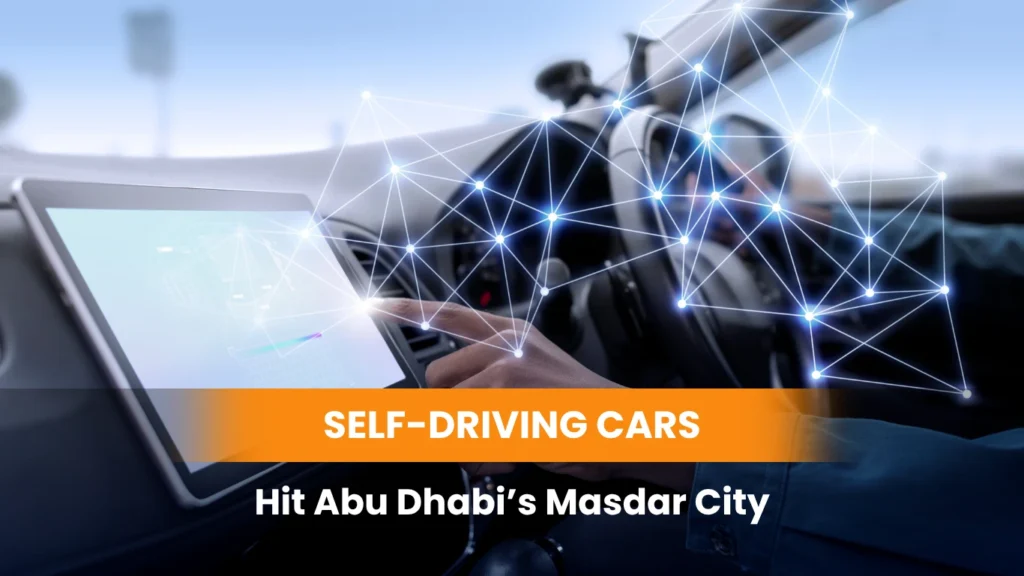Abu Dhabi is fast becoming the global testing ground for futuristic mobility. From electric buses to self-driving delivery vehicles, the emirate has steadily invested in smart technologies to reshape transportation. The latest milestone? Masdar City has rolled out its first Level 4 autonomous vehicles—a leap into a new era of smart mobility UAE.
What makes this update even more significant is that Abu Dhabi has officially issued license plates for driverless cars, turning what was once an experimental concept into a government-recognized reality. With these advancements, sustainable transport Abu Dhabi is not just a policy goal—it’s taking shape on the city’s streets.
Why Masdar City Is the Ideal Testbed
Known worldwide as a hub for renewable energy and green urban planning, Masdar City is a natural choice for innovation in mobility. The city’s closed-loop infrastructure, advanced surveillance systems, and walkable neighborhoods make it an excellent environment for controlled Masdar City trials.
In fact, Masdar has been experimenting with futuristic transit since its early days, from the much-talked-about Personal Rapid Transit (PRT) pods to autonomous shuttles. The addition of Level 4 autonomous vehicles now expands its vision—pushing beyond pilot projects to real-world usage.
The First Licensed Self-Driving Delivery Vehicles
In a historic move, Abu Dhabi has granted the first-ever official license plates to self-driving delivery vehicles. These AI-powered electric pods can navigate Masdar City independently, avoiding obstacles, obeying traffic rules, and ensuring safe last-mile deliveries.
The project is being driven by Autogo, a subsidiary of K2, in partnership with EMX (part of the 7X group). Together, they are pioneering a delivery model that reduces the need for human drivers, lowers carbon footprints, and sets new benchmarks for sustainable transport Abu Dhabi.
With licensing in place, these vehicles are no longer mere trials—they are legitimate contributors to the city’s transport ecosystem. This milestone also signals a major breakthrough in autonomous vehicle regulation, showcasing how Abu Dhabi balances innovation with governance.
Understanding Level 4 Autonomous Vehicles
To appreciate the significance of Masdar’s rollout, let’s break down what Level 4 autonomous vehicles mean.
- Level 1–2: Assistive driving (like cruise control or lane keeping).
- Level 3: Conditional autonomy where drivers must take over when prompted.
- Level 4: High automation within a defined zone. Vehicles can perform all driving tasks independently without needing a human to intervene.
- Level 5: Full automation under all conditions (still years away).
With Level 4 autonomous vehicles, Abu Dhabi is embracing technology that can function driver-free in geofenced areas like Masdar City. These cars rely on advanced AI, LiDAR sensors, real-time mapping, and cloud-based decision-making to navigate urban conditions.
Smart Mobility UAE: A Bigger Vision
The UAE government’s mobility ambitions go beyond convenience. By 2040, the goal is to transition at least 25% of all daily trips to autonomous and smart systems.
Here’s how the current Masdar City trials fit into the broader smart mobility UAE strategy:
- Cleaner transport: Using electric autonomous fleets aligns with Net Zero 2050 climate goals.
- Enhanced safety: AI-driven vehicles are designed to minimize accidents caused by human error.
- Efficiency boost: Smart logistics, like self-driving delivery vehicles, cut congestion and optimize city operations.
- Tourism & innovation appeal: Being a leader in driverless mobility adds to Abu Dhabi’s reputation as a global innovation hub.
The Role of SAVI: Driving Innovation Forward
Abu Dhabi is not just testing these vehicles—it’s creating an entire ecosystem for them. The Smart and Autonomous Vehicle Industries (SAVI) cluster is a dedicated zone for research, manufacturing, and regulatory testing of autonomous technologies across land, air, and sea.
By housing SAVI in Masdar City, Abu Dhabi ensures seamless collaboration between developers, regulators, and businesses. This initiative provides:
- Test tracks and real-world pilot environments
- Funding and incentives for mobility startups
- Streamlined approvals for innovators
- Partnerships with global autonomous vehicle leaders
This cluster is expected to make Abu Dhabi a regional powerhouse for autonomous vehicle regulation and deployment.
Regulatory Framework for Driverless Cars
Innovation cannot thrive without regulation, and Abu Dhabi has made clear progress in this area. The Integrated Transport Centre (ITC) and Department of Municipalities and Transport (DMT) are leading the charge in defining how self-driving delivery vehicles and other autonomous systems operate legally.
Key areas of focus include:
- Licensing & registration of autonomous fleets
- Insurance models for driverless vehicles
- Safety testing and compliance protocols
- Data collection and cybersecurity
- Liability in case of accidents
The issuance of license plates for delivery pods is proof that autonomous vehicle regulation is already operational—providing a framework that balances innovation and public trust.
Benefits for Sustainable Transport in Abu Dhabi
The arrival of Level 4 autonomous vehicles is more than a technological breakthrough—it’s a sustainability strategy.
- Lower emissions: Electric, driverless cars consume less energy and reduce carbon output.
- Reduced congestion: Smart routing prevents unnecessary traffic build-up.
- Cost efficiency: Logistics and ride-hailing become cheaper with fewer human drivers required.
- Safety assurance: Fewer accidents mean less strain on healthcare and insurance systems.
- Urban transformation: Future city planning will prioritize smart roads, sensors, and AI-powered infrastructure.
In short, sustainable transport Abu Dhabi is being redefined with every new vehicle that joins the Masdar City trials.
What’s Next? Expanding Beyond Masdar
While Masdar serves as the launchpad, the long-term goal is to integrate self-driving delivery vehicles and robotaxis into everyday life across Abu Dhabi and the wider UAE. Plans include:
- Scaling from deliveries to full RTA road test Dubai-style robo-taxis (similar to Dubai’s AV trials).
- Expanding into residential and business districts.
- Deploying across logistics hubs for last-mile deliveries.
- Building a strong regional export industry for autonomous tech under SAVI.
Closing Remarks
The arrival of self-driving delivery vehicles and Level 4 autonomous vehicles in Abu Dhabi’s Masdar City marks the beginning of a transport revolution. Supported by Masdar City trials, visionary leadership, and proactive autonomous vehicle regulation, the UAE is solidifying its place as a global leader in smart mobility.
This is not just about innovation for its own sake. It’s about creating cleaner, safer, and more efficient cities. Through sustainable transport Abu Dhabi and initiatives like the Smart and Autonomous Vehicle Industries (SAVI) cluster, the emirate is paving the way for a future where driverless vehicles aren’t just novelties—they’re part of daily life.
Abu Dhabi is showing the world that the future of transportation is already here. And it’s self-driving at Miss Auto UAE.







